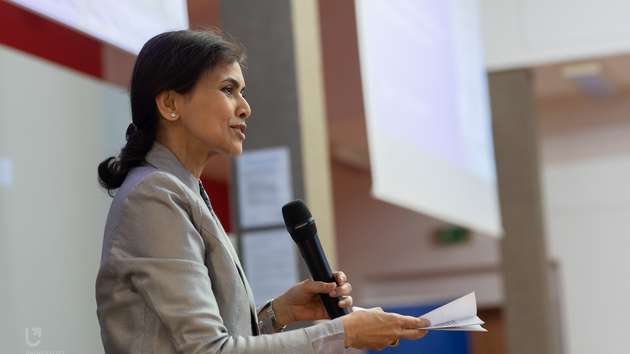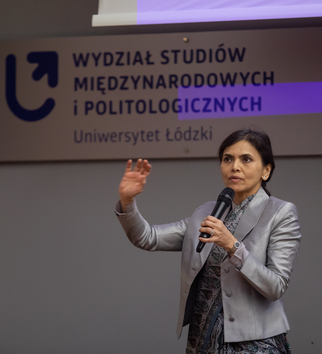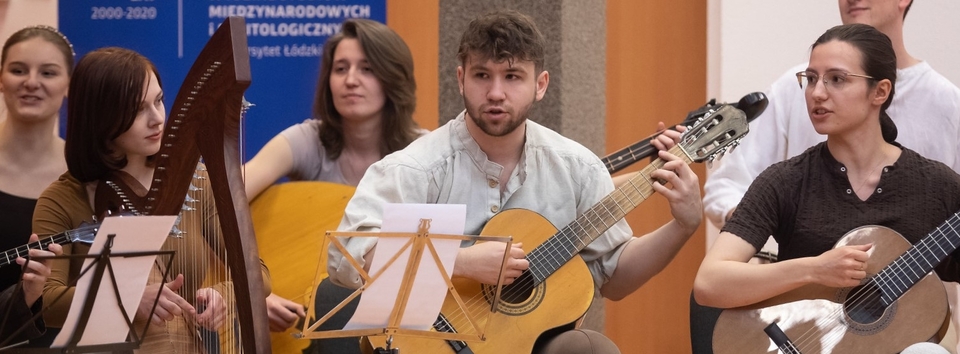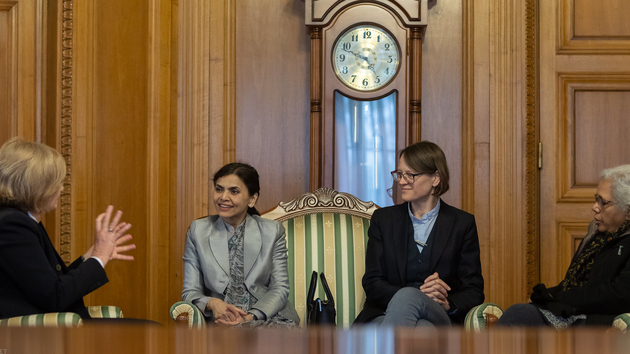The stay of the Indian Ambassador at the University of Lodz began with a welcome by the university authorities and the presentation of exhibitions and stands in the hall of the Prof. Michowicz Assembly Hall prepared by the students of the Faculty of International and Political Studies as part of the Asian Day. Nagma Mohamed Mallick watched the stands devoted to individual countries and cultures of Asia with great interest and talked to the students and faculty employees.
Then, all those invited to the meeting with the Ambassador and her lecture went to the Assembly Hall, where the guest was solemnly welcomed by the Rector of the University of Lodz, Prof. Elżbieta Żądzińska. The university music band ‘Balalaikas’ played the anthems of India and Poland and presented several songs related to Indian culture, which aroused an enthusiastic response from the Ambassador and her warm thanks to the young musicians.
After the concert and the speech by the Dean of Faculty of International and Political Studies – Dr hab. Ryszard Machnikowski, Dr hab. Izabela Kończak and Dr Michał Zaręba talked about the nature of Asian Studies at the University of Lodz. The idea of organising the Asian Day, on the other hand, was presented by Małgorzata Niedźwiedź and Pola Jagodzińska, students of the faculty.
Ambassador Mallick started her lecture entitled "An introduction to diplomacy & the Foreign Policy of India" by outlining the tasks of diplomacy and the role of an ambassador as a representative of their country’s interests, drawing on her own experiences.
In the second part, she discussed the basic assumptions of foreign policy of India, a country – which she emphasized several times – is the largest democracy in the world. She pointed to the great size of India and the ethnic, religious and cultural diversity of its individual parts, and all the problems that the ruling parties have to face.
She also referred to the common threads of Indian history and science with Poland (during the Second World War the provision of shelter in then British India to 5,000 Polish women and children evacuated with the Anders’ Army from the USSR, or Sanskrit studies at the Jagiellonian University conducted since 1860). She also mentioned the Operation Ganga, which she managed, evacuating Indian students to India with the help of the Indian and Polish governments immediately after Russia's invasion of Ukraine.
The meeting with the Ambassador ended with a series of questions about the lecture from students and employees of the faculty, participants of the Asian Day.
The stay at the university ended with a dinner at the Biedermann’s Palace hosted by the Rector of the University of Lodz, Prof. Elżbieta Żądzińska.
Photo report from the visit of the Indian Ambassador to the University of Lodz
Text and edit: Marcin Kowalczyk, Communications and PR Centre, University of Lodz
Photos: Bartosz Kałużny, Communications and PR Centre, University of Lodz








